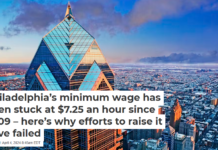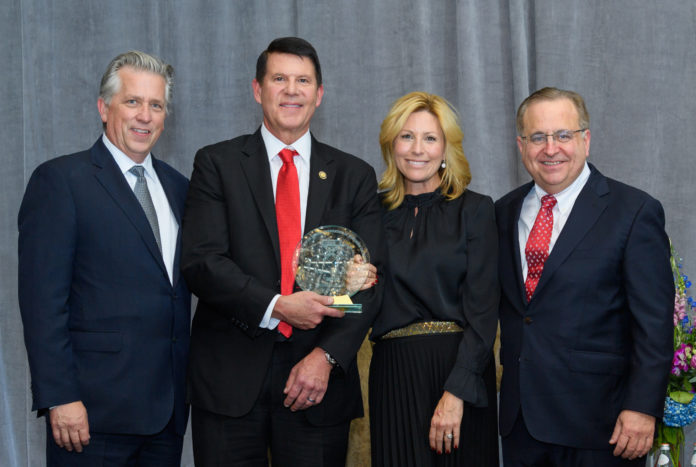

Krach’s extraordinary accomplishments are recognized at 50th Annual HBSANC Gala Fundraiser, attended by hundreds of distinguished HBS alumni and guests.
On November 1, 2019, the Harvard Business School Association of Northern California (HBSANC) celebrated its 50th Annual Business Leader of the Year Award Gala by honoring Keith Krach for his transformational leadership across a broad range of industries and sectors.
Co-founder, Chairman and CEO of Ariba, and later CEO and Chairman of DocuSign, Krach is noted as a category creator and transformational leader across a broad array of sectors. This includes robotics, Business-to-Business (B2B) Electronic Commerce, Mechanical Design Synthesis, Digital Transaction Management (DTM) and e-Signature, as well as philanthropy, education, mentorship, and now global economic diplomacy.
Past recipients of this prestigious award include former Secretary of State George Schultz, Intel’s Andy Grove, Yahoo’s Carol Bartz, Cisco Systems’ John Chambers, Charles Schwab, and Hewlett-Packard co-founders Bill Hewlett and David Packard.
Nearly 500 HBS alumni and guests joined the celebration to honor Krach at San Francisco’s historic Palace Hotel. Distinguished speakers were Michael Brown, Stanley McChrystal, and Das Narayandas.
Brown is the Senior Advisor and Co-Founder of City Year, an education-focused nonprofit organization that mobilizes 3,000 young people for a year of full-time service in high-need schools in 29 US cities. McChrystal is a retired Four-Star U.S. Army General and founder of the McChrystal Group. Narayandas is the Edsel Bryant Ford Professor of Business Administration at the Harvard Business School.
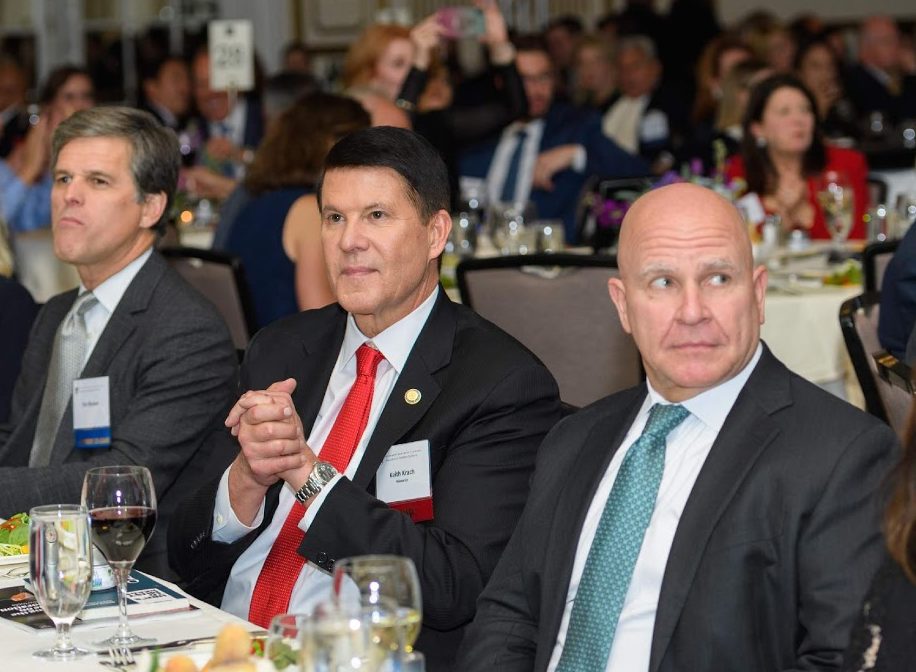
Krach, who was unanimously confirmed by the U.S. Senate earlier this year to serve as Under Secretary of State for Economic Growth, Energy, and the Environment, took a brief break from a blistering diplomatic schedule to join in the celebration, along with wife Metta and son, Carter. Krach renewed connections with hundreds of friends, former colleagues and business partners. He also addressed the gathering with insights from his new leadership role; developing and executing a proactive global strategy for economic diplomacy that is an extension of the U.S. National Security Strategy Platform.
“This is just beyond my words,” Krach said to the audience. “For a guy who’s always on an endless quest to jump in water over his head and get bloodied in the ring, this is a humbling night. And when I look at that list of past honorees, honest to God, I think I came into the wrong ballroom.”
Among his list of accomplishments: Krach was chairman of DocuSign from 2009-2018, and served as its CEO from 2011-17. He built the company from a 50-person start-up and took it to a multi-billion dollar IPO in 2018. Krach led the transformation of DocuSign to become the leader for the category he created, Digital Transaction Management. This accelerates commerce between companies and individuals at any time from any place, on any device. DocuSign also reduces the ecological impact of paper transactions.
Today the DocuSign Global Trust Network comprises more than 400,000 companies and has over 400 million users in 188 countries.
In 1996 Krach co-founded Ariba. The company became the world’s fastest growing software company and largest e-commerce network. Ariba’s enterprise software revolutionized business-to-business e-commerce. Ariba accelerated transactions by eliminating laborious paper procurement. Krach served as the company’s chairman and CEO from 1996-2003.
Krach took Ariba public in 2000, and ultimately achieved a market capitalization of more than $40 billion. Today, more than $3 trillion in commerce is transacted annually through the Ariba network, which is more than Amazon, eBay and Alibaba combined.
Krach’s list of honors includes receiving a Lifetime Achievement Award from the Silicon Valley Leadership Group, earlier this year; Ernst & Young’s 2000 National Entrepreneur of the Year; the World Economic Forum Technology Pioneer Award; the Bay Area’s Most Admired CEO Award; and Life & News 2018 Transformational Leader of the Year award.
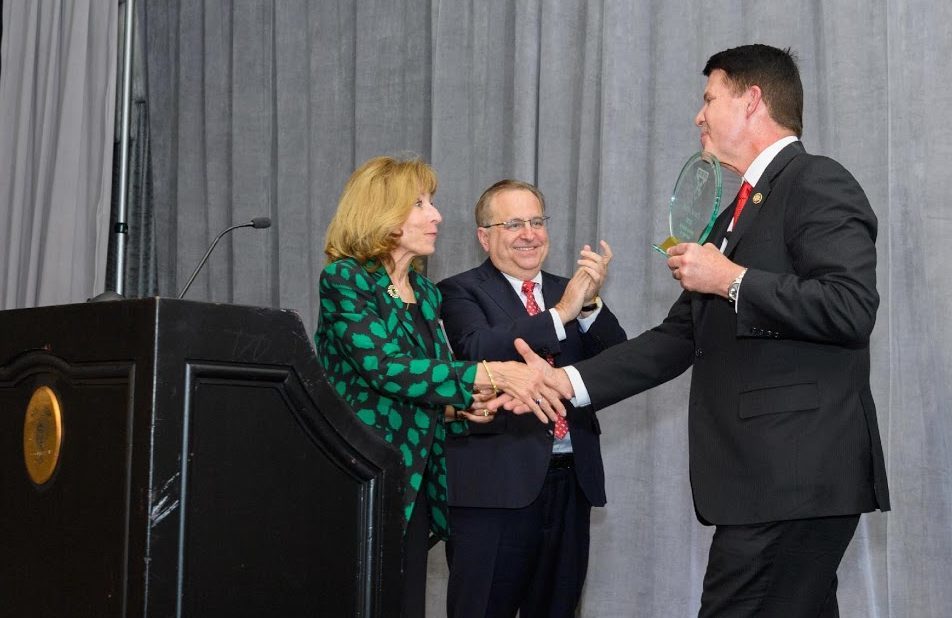
Awards Gala chairwoman Jean Kovacs described Krach, whom she’s known for almost 20 years, as a leader, a mentor, a businessman, a family man, a philanthropist.
“I know that you will be as inspired as I am to listen to his journey that brought him to this point and to hear his vision for what comes next,” she added.
Salman Khan, founder and CEO of Khan Academy and HBSANC 2017 Business Leader of the Year, said in a statement “Throughout his career, Keith has brought powerful transformational leadership to many sectors…His focus on innovation and productivity combined with his approach of perpetually challenging the status quo and empowering people to accomplish more than they had ever imagined possible has resulted in a profound impact on GDP per capita, international trade and the sustainability of our planet.”
Bruce Harreld, Harvard Business School’s former faculty chair of Building New Businesses, lauds Krach as a “category kingmaker.” Harreld notes that Krach built game-changing companies by pioneering robotics, engineering software, e-commerce, and e-signature and digital transaction management.
Krach’s companies are disruptors, Harreld said. They became clear market leaders through category creation and generated significant shareholder value.
Michael Brown addressed the gathering as a special guest speaker. A graduate of Harvard College and Harvard Law School, Brown led City Year for 30 years, including serving 13 years as CEO. He’s currently their Senior Advisor.
City Year has 32,000 alumni who have contributed more than 54 million hours of service and earned access to more than $150 million in college scholarships through the AmeriCorps National Service Trust.
Addressing the audience early in the gala, Brown said “anyone who gets to know Keith and Metta knows one thing about each of them: Keith Krach is larger than life and Metta is larger than love. It is a powerful combination and they are an amazing team full of purpose and passion for their family and their five kids.”
Metta Krach is a Georgetown Law School graduate and former senior corporate counsel to The Gap.
“Metta’s the greatest mother of five,” Krach said to the audience. “Don’t mistake her kindness for weakness. But she’s the kindest person I know.”
Brown saluted the Krachs for their “remarkable generosity and civic leadership.” The Krach Family Foundation supports the work of numerous philanthropic endeavors including the New Story Charity, Opportunity International, the Children’s Autistic Network and City Year to name just a few.
The Krachs were honored as a couple by receiving City Year’s 2018 Citizen Leadership Award for their inspiration, dedication and service to the community.
Brown lauded Krach’s values which included “the importance of being a leader in both business and the community.”
The gala also included an insightful fireside chat with Krach conducted by Gen. McChrystal, and Krach’s award acceptance speech.
The annual business leader dinner is the chief fundraiser for HBSANC. HBS Community Partners is an award-winning nonprofit program whose mission it is to harness the business school talent of HBS as alumni and channel it for social good.
HBSANC annually provides access to over 100 innovative programs. These include HBS professor talks that facilitate lifelong learning, and events that feature local leaders who have built some of the most successful companies in Silicon Valley.
“Harvard Business School alumni are eagerly lending their expertise,” said Elaine McDonald, executive director of HBS Community Partners of Northern California. “Last year alone, approximately 10,000 hours of consulting and advisory services were donated to nonprofits valued at 2.5 million dollars.”
Brown said “You can’t scratch a good thing that’s going on in this community in the Bay Area and not find it has an HBS alumnus behind it. So congratulations to you all and thank you for all that you do.”
Fireside Chat
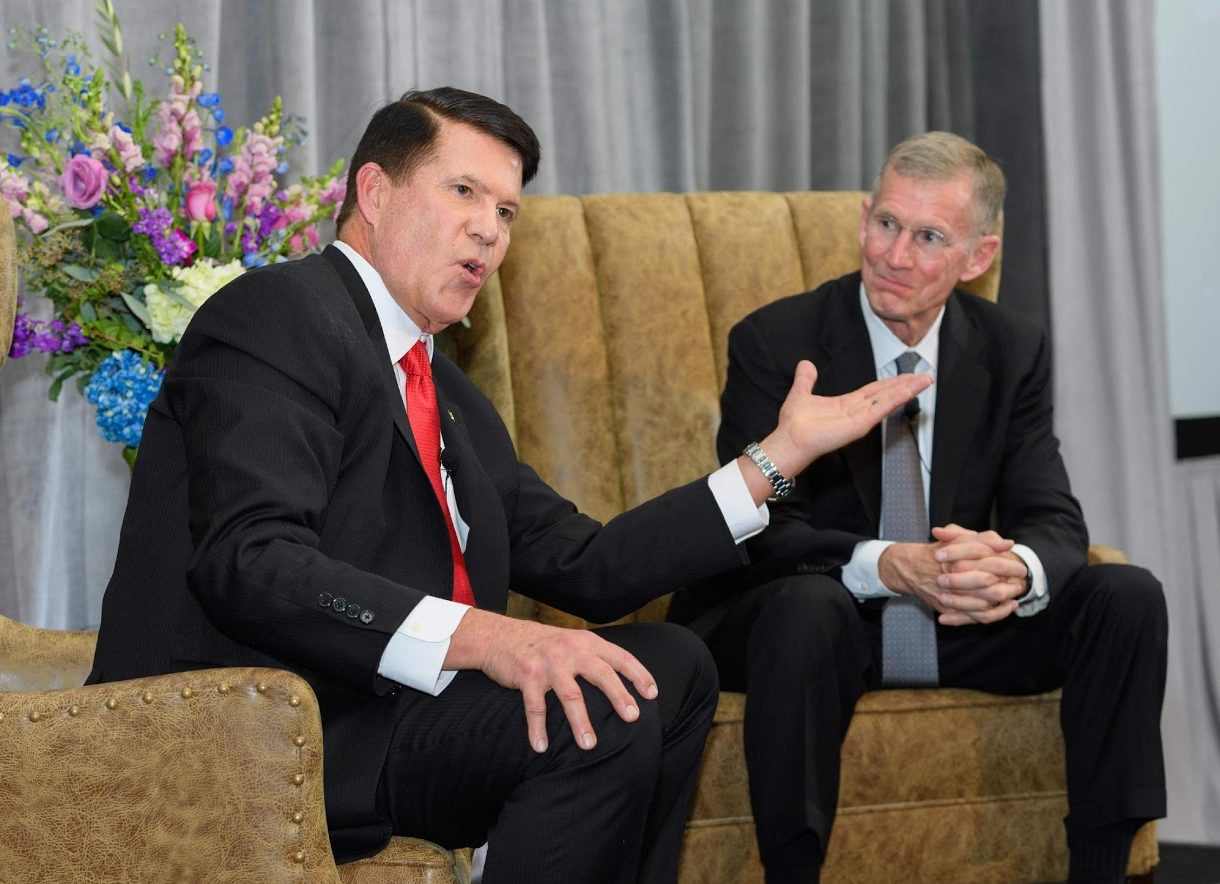
At the dinner Gen. Stanley McChrystal conducted a fireside chat with Krach.
Former Defense Secretary Robert Gates said McChrystal is “perhaps the finest warrior and leader of men in combat I ever met.”
A West Point graduate, McChrystal was commander of the U.S. International Security Assistance Forces in Afghanistan, where he led more than 150,000 troops and 45 allied countries. He’s also the former commander of the Joint Special Operations Command, which revolutionized the way terrorism is combated in the world. It was under his command that JSOC forces captured Saddam Hussein.
McChrystal retired from the U.S. Army in 2010 as a four-star general. He then co-founded the McChrystal Group, a leadership consulting firm where he applies perspectives and insights from the battlefield to the boardroom.
“I’ve got the opportunity to introduce Keith, and then I was promised I could interrogate him for 30 minutes and we will do that,” McChrystal told the audience.
“Here’s how I would describe Keith,” McChrystal began. “I spent a lifetime being a soldier. And I grew to admire certain things in leaders. Had I been in a unit and Keith Krach had been brought in as a civilian, given a uniform, made a general officer in the army, I’d have followed him anywhere. I would without question have accepted his leadership because he gives more to us than he takes from us.”
McChrystal asked Krach about his transition from the private sector to government service came about.
Krach said when he was still chairman at DocuSign he went to Guangzhou in China for a business leadership summit his friend, Fortune CEO Alan Murray, organized. Krach spent two weeks there. He got a chance to listen to five of China’s Politburo members and see what he’s called their “bleeding-edge” technology.
He thought these technologies could be used in alarming ways against the United States and our allies, especially because they were being demonstrated by people who had some very unflattering and untrue things to say about the U.S.
Krach wanted to share first-hand with officials in Washington D.C. what he’d seen. Shortly after his return to the U.S. he flew to Washington D.C. and visited the Office of Science and Technology. Krach also knew Vice President Mike Pence, who succeeded Mitch Daniels as governor of Indiana after Krach successfully recruited Daniels to serve as president of Purdue University.
When Krach met with the vice president, Pence relayed a story to his chief of staff on how he tried to talk Krach into a third term as chairman of the board of trustees at Purdue.
“`But no,’” Krach recalled Pence saying to his chief of staff, “`he’s got to run some little software company. How’s that going Keith?’ I said `well, Mr. Vice President, we went public a few months ago. It’s worth $9 billion dollars now—and they just fell on the ground laughing. I said I’m going to be leaving in about a year. And he looked at me and said, `Have you ever thought about serving your country?’ And I said, ‘That’s a dream I never knew I had before. I’d be honored.’”
It’s also a responsibility he felt he had, given the threats to democracy he’d seen in the far east.
Krach was nominated to his post in January 2019 and then unanimously confirmed by the senate in June—something that doesn’t happen very often in our capital today.
“It’s the greatest privilege of my life to be able to serve a country that has given so much to my family and me,” Krach said.
Early on, Secretary of State Mike Pompeo gave Krach his big-picture assignment: “`To develop and operationalize a proactive, integrated strategic plan to combat economic aggression and maximize national security,’” Krach said.
“National security is global economic security,” Krach says. “It’s not only how well the United States economy runs and how competitive we are, but it’s also the other nations, too, particularly the free ones.”
Krach shared that the same playbook and principles he’s used to succeed in Silicon Valley and the private sector transfer to government work.
“When you’re in a leadership position,” Krach said, “it’s all about building a high-performance team. And literally the organization with the best people wins. Diversity of thought is the catalyst of genius. You’ve got to get everybody working together as a team. The way to do that is you must have a noble cause and you must have a (target or obstacle you want/need to overcome). Then what you need is a plan and you’ve got to set a crystal-clear direction. That’s the vision, the mission, the values, the team rules, the long-term goal, strategy, and then it all boils down to execution.”
And then with all of that in place, “You challenge the status quo. That’s where the fun comes in,” Krach said. “In Silicon Valley, we call that disruption. You look for a paradigm shift.”
Keith Krach Speaks
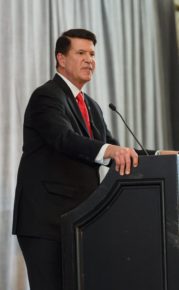
When it came time for Krach to address the gala audience, he said: “I’ve been blessed with the American dream. My life’s pretty much been focused on building innovative companies by building high performance teams and then pursuing those opportunities they never dreamed of or ever imagined. And now I have the great honor of leading economic diplomacy for the United States and to give back, as I said, to this great country that’s given so much to a family and to me.”
In his few short months at the State Department, Krach emphasized how he’s come to appreciate the enormity and the gravity of the challenges the United States faces.
He said nations that are in an ideological battle with the U.S. employ cyber warfare and weaponized economic competition. “And both sides of the aisle truly understand that our rivals are playing the long game. They’re playing a four-dimensional game of military, diplomatic, economic and cultural chess. And they are playing for keeps.”
Krach warns these adversaries have “little respect for basic human rights, the rule of law, intellectual property, sovereignty of nations, or the environment.”
He cautioned “there is nothing permanent about superpower advantage, because it can vanish in an instant. And so can democracies around the world. That’s what I’m learning.”
It’s why Krach says he’s not only so committed to diplomacy but also to helping to develop the next generation of transformational, principled leaders to ensure the world is safer and better for all.
“We need them more than ever to protect that American dream,” Krach said. “We need leaders who can envision solutions to tackle tough problems. Our basic moral principles and democracy are under threat. We need honorable leaders to defend and champion those ideals. Yes, we need more transformational leaders than we ever had before. And it takes mentorship to get there.”
Krach said he’s had great transformational leaders who cared enough to mentor him.
One of these was John Chambers, then CEO and Chairman of tech giant Cisco Systems. Chambers began mentoring Krach when he was running Ariba.
A year into their mentee-mentor relationship, Krach recalls, Chambers shared why he was mentoring him. Chambers said when he was newly arrived in Silicon Valley from Boston, he was mentored by Lou Platt, then the CEO of Hewlett Packard. When Chambers asked Platt why he was mentoring him, Platt said because someone had done it for him.
“`So, Keith, I don’t ask for anything in return,’” Krach recalls Chambers saying. “`I just ask that you do this for somebody else. And Keith, that is the magic of Silicon Valley.’”
Krach said he’s been proud to be a mentor to numerous colleagues from Ariba who went on to become CEOs.
“Mentorship is a 60-60 deal,” Krach said. “You learn more from your mentee. And it’s a beautiful relationship.”
With the goal of making mentorship scalable, and to pass on the magic of Silicon Valley, Krach’s last venture in the private sector before entering government service was founding the Global Mentor Network (www.GlobalMentorNetwork.net) in 2019. He founded it as a public-benefit corporation so that it can give back to society.

GMN’s big-picture mission is to help create the next generation of transformational leaders to solve the world’s biggest challenges in busi24ness and society by delivering mentorship at scale. Already, the Global Mentor Network includes insights from great mentor leaders like General Stan McChrystal, Michael Brown, Sal Khan, founder of the Khan Academy, Kim Hammonds, former COO of Deutche Bank, and Leah Busque-Solivan, founder of Task Rabbit. More mentors are being added every month.
“We need things like the Global Mentor Network,” Krach said. “I’ve had a lot of people ask me, `What’s your greatest legacy going to be? Well, other than my family, on the professional side, it’s not going to be the companies we’ve built. It’s going to be the lives touched. And so I think my ultimate legacy in the business world or in the professional world will be the leaders I’ve mentored and their mentees.
He added “I do think it’s about developing that next generation of transformational leaders. That’s the thing that’s going to be able to create a great future.”
Krach reflected on the evening in a sentimental way: “My dad always would say, you’re as rich as you have friends. And he was right.”
At Krach’s State Department swearing-in ceremony in September, 300 of his friends showed up. The State Department announced from the stage that day that never in the history of this kind of federal appointment had there been so many people attending.
“I said at my swearing in, I feel it again tonight,” Krach said, “I feel like Jimmy Stewart in `It’s a Wonderful Life.’ And my dad is Clarence ringing the bell and encouraging me to remember the moment.”




